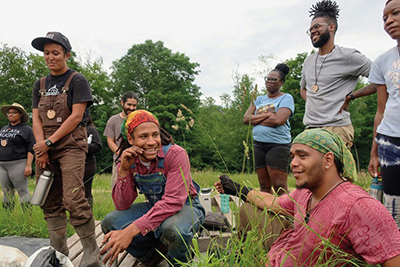
In the southern states of the U.S., the question of land ownership has a powerful racial aspect; over the past 100 years there has been a sharp decline in Black ownership of farm land—partly due to the heirs property system.
This system deals with the ownership of land left without a will, which often happened among Black landowners in the South who had a deep distrust of the legal system or did not have access to a lawyer. Under heirs property, the descendants inherit an interest in the land, similar to holding stock in a company. But this leaves them at risk from laws and loopholes that allow speculators and developers to obtain the property, forcing them into a sale against their will.
It’s a serious problem for racial equity in terms of land ownership, with heirs property taking up an estimated third of Black-owned land in the southern U.S.—3.5 million acres, worth more than $28 billion. It is estimated that African Americans lost about 90 percent of their farmland between 1910 and 1997.
Cooperation—based around principles of equality and democratic ownership—is ideally placed to help reverse Black land loss, and the Federation of Southern Cooperatives (FSC), a nonprofit association of black farmers, landowners and co-ops, is doing just that.
Cooperation—based around principles of equality and democratic ownership—is ideally placed to help reverse Black land loss, and the Federation of Southern Cooperatives, a nonprofit association of black farmers, landowners and co-ops, is doing just that.
The Federation has used outreach tools, education and technical assistance to support Black land ownership. It works to resolve heirs property issues, helps with estate planning, and develops alternative ownership models such as corporations, cooperatives, trusts, limited liability companies and intra-family buy-outs. Its Regional Heirs Property and Mediation Center, with offices in Georgia, Alabama and Mississippi, works with 600 heirs every year.
Earlier this month, the Federation hosted Forward 2021: National Heirs Property Conference to discuss the issues. The virtual event offered “an intense, two-day boot camp style experience for heirs property owners to kick start their efforts to resolve their heirs property issues and unlock their land’s wealth-building potential.”
It also included master classes taught by heirs property experts and one-on-one meetings with resource professionals including attorneys, U.S. Department of Agriculture (USDA) agency representatives, lenders, genealogy experts, community development professionals, foresters, mediators, and business development professionals from the hemp, solar, gas and oil industries.
There are other land ownership initiatives putting co-op ideas into play in the southern states. The Freedom Georgia Initiative has seen 19 families buy nearly 97 acres of land in Georgia. The site, near Macon in Wilkinson County, follows a vision “to create a community that is thriving, that is safe, that has agriculture and commercial businesses that are supporting one another and that dollars circulating in our community.” The families were inspired to create a safe haven in the wake of the unrest that tore through the U.S. this year after a series of deaths of Black people in police custody.
“The Freedom Georgia Initiative was established out of an extreme sense of urgency to create a thriving safe haven for black families in the midst of racial trauma, a global pandemic and economic instabilities across the United States brought on by COVID-19,” organizers said. “We wanted to do our part to create safe spaces for Black faces and their allies. Out of our desire to create generational wealth for our families, we wanted to provide a place for restoration, recreation and reformation for families during this time.”
Such projects aren’t confined to the southern U.S. In New York state, Soul Fire Farm “is an Afro-Indigenous centered community farm committed to uprooting racism and seeding sovereignty in the food system.” It is “training the next generation of activist-farmers and strengthening the movements for food sovereignty and community self-determination.”
Soul Fire projects, which involve 10,000 people a year, include farmer training for black growers, reparations and land return initiatives for northeast farmers, food justice workshops for urban youth, home gardens for city-dwellers in food deserts, doorstep harvest delivery for food insecure households, and systems and policy education for public decision-makers.
The farm itself was founded in 2010 on a 72-acre site in Petersburg by Leah Penniman and Jonah Vitale-Wolff. Committed to natural land stewardship, they have sequestered 50,000 tons of carbon, and have mounted a sustainable operation: all buildings are made from wood sourced within a 20 mile radius, and the site uses natural hay bale insulation and solar power, with land use encouraging biodiversity.
It has similar ambitions on food solidarity and follows the Ujamaa model of cooperative economics—a call for the Black community to self-define its economic future by building Black-owned businesses and cooperatives. Historically, Ujamaa was introduced in Tanzania by its first president Julius Nyerere, who used the philosophy to develop a national infrastructure centered on communal values.


